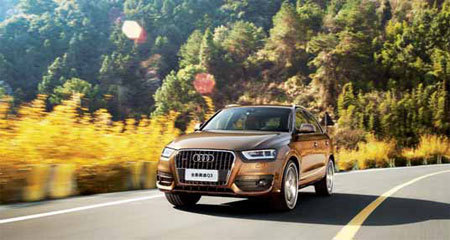Audi confident about sales goals
Updated: 2013-04-15 07:58
By Xu Xiao (China Daily)
|
||||||||
|
The locally made Q3 was produced in FAW Volkswagen's new factory in Foshan. |
|
According to Audi, the Q3 delivers a great driving experience. Photos Provided to China Daily |
Hopes to sell 700k units in China annually by 2015
Audi plans an aggressive localization strategy to meet its China sales goals over the next two years, said a top official with FAW Volkswagen.
By 2015, the company aims to increase annual sales of its locally made models to 700,000 units in China, said Dominique Boesch, managing director of the Audi sales division at FAW Volkswagen.
Released earlier this year, the target demonstrates Audi's commitment to its strategy of localization, Boesch said.
"I think it is the right way and right time to raise this target, based on our understanding of the market," Boesch said during the unveiling of the locally made Audi Q3 on April 8 in Shenzhen, which is near the facility in Foshan where the model was produced.
The Q3 is the second SUV Audi has released in China. The first was the Q5, local production of which began in 2010.
By localizing its products in China, Audi's growth has outpaced that of competitors in the luxury segment.
However, the Q3 is not the first premium compact SUV to be produced locally. BMW launched its X1 last year.
Boesch repeatedly emphasized the importance of timing with regard to the company's strategy.
"When we approach localization, (the timing) does not depend on competitors, but on our own right time, " he said. "Now is the right moment to localize the product."
The model, with six variants, is priced at between 285,000 yuan ($46,005) and 428,800 yuan.
Equipped with a 2.0 TFSI engine and a seven-speed S tronic transmission, the model can produce peak power of some 147 kW/h, and top torque of 280 Nm.
Only the two entry-level variants that specifically cater to the Chinese market are front-wheel driven. The rest feature Audi's iconic quattro all-wheel drive system.
Unlike the Chinese versions of the A4 and the A6, which have a stretched wheelbase, the locally made Q3 is the same size as the imported model.
"That we didn't stretch the wheelbase a little bit like our competitors did is based on our deep understanding of the changing market, " Boesch explained.
Agility and handling
Maintaining the normal size of the Q3 ensures agility and handling while driving. He said that many people who were formerly chauffeured now drive, so they are concerned with both drivability and comfort.
He added that the locally made Q3 is not confined to the premium compact SUV market.
"It also targets customers who are above or below this segment or even do not belong to the segment."
He said the market is growing and that the word "dynamic" describes both the Q3 and its customers .
The company said the new Q3 is aimed at young and fashionable urban elites.
To cater to this group, the company made a short film titled A Tale of Two Cities.
Featuring two popular screen idols, the movie is a love story about a male art gallery owner and a female magazine editor who long to escape their boring lives. One day, the two are brought together by the Q3, which stands for freedom, an easy life and passion.
He said the locally made Q3 has further enriched Audi's China lineup, helping to make the Audi brand more specific and personalized in the country.
But he declined to say when the company will introduce the 1.4T and 1.8T version for localization. He said the current lineup is "based on what Chinese customers are asking for".
He said the new Q3 will build on the success of the Q5. The company cannot be 100 percent sure about the Q3's production capacity because delivery of the model has just begun on the Chinese market. But they have made enough preparations and will try their best to meet market demand.
"We have advantages both in the product itself and our localization in China," he added.
Reshaping trends
Boesch did not disclose the anticipated sales target of the locally made Q3 but said that the company believes the model has the potential to lead China's premium compact SUV market by "reshaping the trend."
In the first three months of 2013, Audi sold 101,800 vehicles, up 14 percent from a year earlier.
Last year, Audi's annual sales on the Chinese mainland and in Hong Kong broke the 400,000-unit benchmark, increasing 29.6 percent year-on-year.
To reach its target of 700,000 units by 2015, the company must maintain an annual growth rate of 30 percent in actual sales, Boesch said.
"China is the most important market for Audi. Audi AG believes its current cooperation with FAW is the best way to work together," he added.
Boesch said he is optimistic about the premium SUV market in China.
"I remain very confident of the long-term growth of Audi and the luxury auto market in China," he said.
"For one thing, China's GDP will maintain healthy and stable growth for a long time. Also, customers here are looking forward to more localized products," said Boesch.
Thus Audi's localized strategy will be aligned with the personalized demands of the customers. Boesch said Audi has an excellent understanding of Chinese customers' psychology that has been honed through 20 years in China.
In a market with such potential, Audi should pursue quality while growing steadily, he said.
xuxiao@chinadaily.com.cn
(China Daily 04/15/2013 page19)

 In Photos: 7.0-magnitude quake hits Sichuan
In Photos: 7.0-magnitude quake hits Sichuan
 Li Na on Time cover, makes influential 100 list
Li Na on Time cover, makes influential 100 list
 FBI releases photos of 2 Boston bombings suspects
FBI releases photos of 2 Boston bombings suspects
 World's wackiest hairstyles
World's wackiest hairstyles
 Sandstorms strike Northwest China
Sandstorms strike Northwest China
 Never-seen photos of Madonna on display
Never-seen photos of Madonna on display
 H7N9 outbreak linked to waterfowl migration
H7N9 outbreak linked to waterfowl migration
 Dozens feared dead in Texas plant blast
Dozens feared dead in Texas plant blast
Most Viewed
Editor's Picks

|

|

|

|

|

|
Today's Top News
Live report: 7.0-magnitude quake hits Sichuan, heavy casualties feared
Boston suspect cornered on boat
Cross-talk artist helps to spread the word
'Green' awareness levels drop in Beijing
Palace Museum spruces up
First couple on Time's list of most influential
H7N9 flu transmission studied
Trading channels 'need to broaden'
US Weekly

|

|









